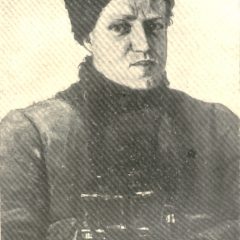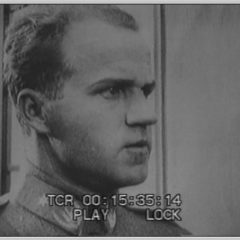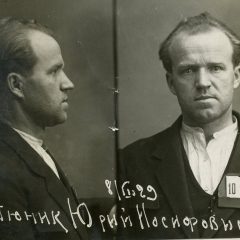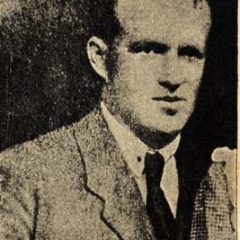Yurii Tiutiunnyk
(1891-1930)
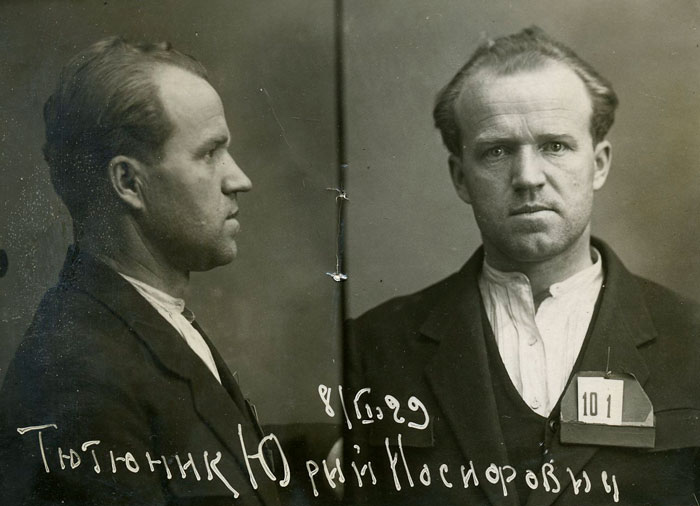
Yuri (Yurko, Yurtyk) Tiutiunnyk was a prominent Ukrainian military and political figure, one of the leaders of the national liberation struggle for the independence of Ukraine during 1917-1921, the brigadier general of the Ukrainian People’s Republic Army, author of several books about Civil War in Ukraine and co-author of Zvenyhora film script.
Yurko Tiutiunnyk was born in a peasant’s family in the village of Budyshche, Zvenyhorod county, Kyiv guberniia. He was a grandson of Taras Shevchenko’s sister, Yaryna. Having graduated from the agricultural school in Uman in 1913, he was mobilised and did his military service in Vladivostok. With the outbreak of World War I, he was a non-commissioned officer of the Imperial Russian Army; he was wounded twice.
In 1915, by the recommendation of the military leadership, he graduated from the military school in the city of Gori in the Caucasus. After the second injury, he was sent to Simferopol to the 32nd Reserve Regiment, where he served until the February Revolution.
In the spring of 1917, Tiutiunnyk fought for the establishment of the First Simferopol Regiment named after Hetman Doroshenko, one of the first Ukrainian national military formations. On June 5-10 (June 18-23, Gregorian calendar), he attended the Second Military Congress, where the First Universal was declared by the Revolutionary Parliament of the Central Council, which he joined as a member. Since the leaders of the Central Council hindered the process of creating a regular army, in the autumn of 1917, Tiutiunnyk formed a Free Cossacks unit in Zvenihorodka and became its otaman.
After the conquest of Kyiv by the Bolsheviks in February 1918, he enlarged the Zvenihorodka unit to 20 thousand rebels. In fierce battles, Tiutiunnyk defeated the Bolshevik-loyal 8th army, occupied Birzula and Vapniarka, disarmed a part of the 2nd Russian corps, the cavalry brigade, defeated Mikhail Muravyov’s 8,000-strong group in Bobrinsk. During the Hetmanate, from the summer of 1918, Tiutiunnyk’s unit led a guerilla war against the Austro-German units and was the driving force of the insurgent movement in central and southern Ukraine, participating in the anti-Hetman uprising, subordinating to the Ukrainian National Union, which was the coordination centre of the uprising.
After the overthrow of the Hetmanate, Tiutiunnyk’s rebels supported the Directory of the Ukrainian People’s Republic and became a part of its army. Under conditions of renewed hostilities with the Bolshevik Russia, Tiutiunnyk, who doubted the Directory’s ability to hold the revolutionary leadership of the rampant people, united with the rebel detachments of otaman Hryhoriev (Nychypor Servetnyk), the commander of Kherson Division of the Armed Forces of the Ukrainian People’s Republic, who then joined the Bolsheviks.
On 4 April 1919, Hryhoriev and Tiutiunnyk occupied Odesa, forcing evacuation of the headquarters of the French airborne division, which had been in control of the South of Ukraine since December 1918. Tiutiunnyk became the military commander of the city. However, as early as May 7, Hryhoriev and Tiutiunnyk, protesting against the Bolshevik terrorism in Ukraine, launched an anti-Bolshevik uprising joining forces with Makhno. After Hryhoriev’s assassination by the anarchist leader Nestor Makhno in July 1919 and the dispersion of part of Hryhoriev’s rebel formations, Tiutiunnyk with the remains of his rebel army reunited with the Ukrainian People’s Republic Army, which fought on three fronts, with the Bolsheviks, with Denikin’s Volunteering Army and with the Polish Republican Army (the “triangle of death”).
Holding a small territory in the area of Kamianets-Podilskyi from 6 December 1919 to 5 May 1920, the Ukrainian People’s Republic Army made a guerilla raid to the rear of the Red Army, that was called the First Winter Campaign, and was considered the most heroic military action by the Ukrainian Regular Army. Tiutiunnyk participated in the campaign as an assistant to General Mykhailo Omelianovych-Pavlenko, heading Kyiv (Marksman) division, with which he fought against the Bolsheviks until the fall of 1920, when the Ukrainian army was interned in Poland.
In the spring of 1921, Tiutiunnyk developed a plan for the Second Winter Campaign in order to provoke anti-Bolshevik uprising in Ukraine. However, the military campaign, which was approved and funded too late (Symon Petliura delayed the appointment of the campaign date, and protests in Ukraine itself somewhat subsided with the proclamation of the new economic policy and the end of the “military communism” phase), ended in a tragedy: the State Political Directorate were aware of the plans of the Ukrainian People’s Republic government, so Tiutiunnyk’s units were lured deep into Ukraine and destroyed near Bazar, where 359 soldiers, who refused to surrender, were shot down by Hryhorii Kotovskyi’s brigade.
In 1923, Tiutiunnyk crossed the Polish-Soviet border in order to meet with the heads of the territorial rebel committees, whose activities he coordinated after the Second Winter Campaign. As it turned out, the Rebel Network had actually been created by the State Political Directorate specifically to misinform the representatives of the Ukrainian People’s Republic. Seized by the SPD, he agreed to cooperate with the Soviet authorities and was released after a short arrest. He resided in Kharkiv, where he lectured at the Red Foremen School.
Apparently, with the help of former high-profile fighters in the People’s Commissariat of Education (Narkomos) who became close to him in 1919 during Hryhoriev’s uprising, he got the position of a scriptwriter at VUFKU and got acquainted with young Ukrainian writers who cooperated with the Photo Cinema Administration.
In 1926, Tiutiunyk was invited to play in the action film P. B. P. (Pilsudskyi Bought Petliura) by Aksel Lundin, written by Heorhii Stabovyi, where he was to play himself and recreate the tragic events of the Second Winter Campaign. Tiutiunnyk’s fierce enemy, Hryhoryi Kotovsky, was supposed to be his partner in the film, however, he had been killed under unknown circumstances (one theory is that it was Stalin’s order) just before the shooting started.
The film turned out ill-considered and non-dynamic, and the flashy battle scenes confused the poorly written plot even more. Determined and charismatic, uncompromising and principled, Tiutiunnyk, who openly criticised the Soviet authorities, quickly became an idol of young Ukrainian neo-romantic writers.
One of them, Maik Yohansen, became his co-author for the script of the historical and revolutionary epic Zvenyhora which used the national mythology abundantly. The idea of Zvenyhora apparently belonged to Tiuiunnyk, and it might have reproduced one of the legends of his home area – the suburbs of Zvenyhorodka. However, the intricate multi-layered plot was undoubtedly developed and detailed by Yohansen, who was one of the masters of adventurous prose of the 1920s.
According to Dovzhenko’s memoirs, all the directors present at the reading in the editorial office VUFKU refused to deal with such a complicated script, and then Dovzhenko took to its radical revision and filming. Obviously, the role of Yurii Yanovskyi, Dovzhenko’s close friend and the editor of Odesa Film Studio VUFKU, should not be underestimated in making this decision: Yanovskyi admired Tiutiunnyk and even portrayed him as Shakhai in his second novel The Four Sabers (1931). After the film release, Tiutiunnyk and Yohansen removed their names from the credits, protesting against Dovzhenko’s distortion of the basic idea of the film.
On 12 February 1929, Tiutiunnyk was arrested in Kharkiv and sent to Moscow. On 20 October 1930, he was shot in the SPD internal prison in Lubianka without a trial as a “traitor to his homeland and spy.
